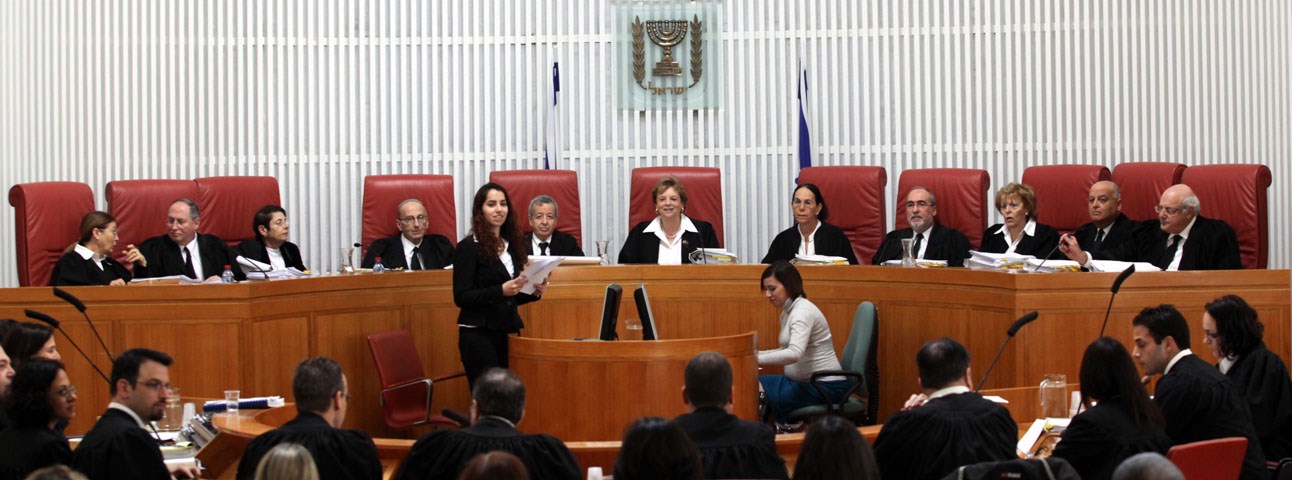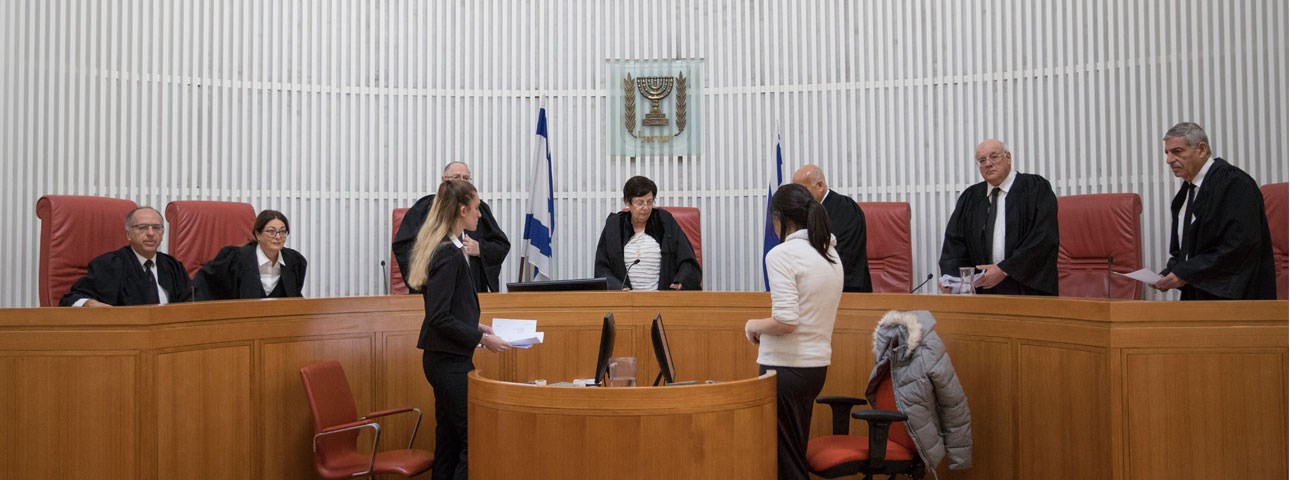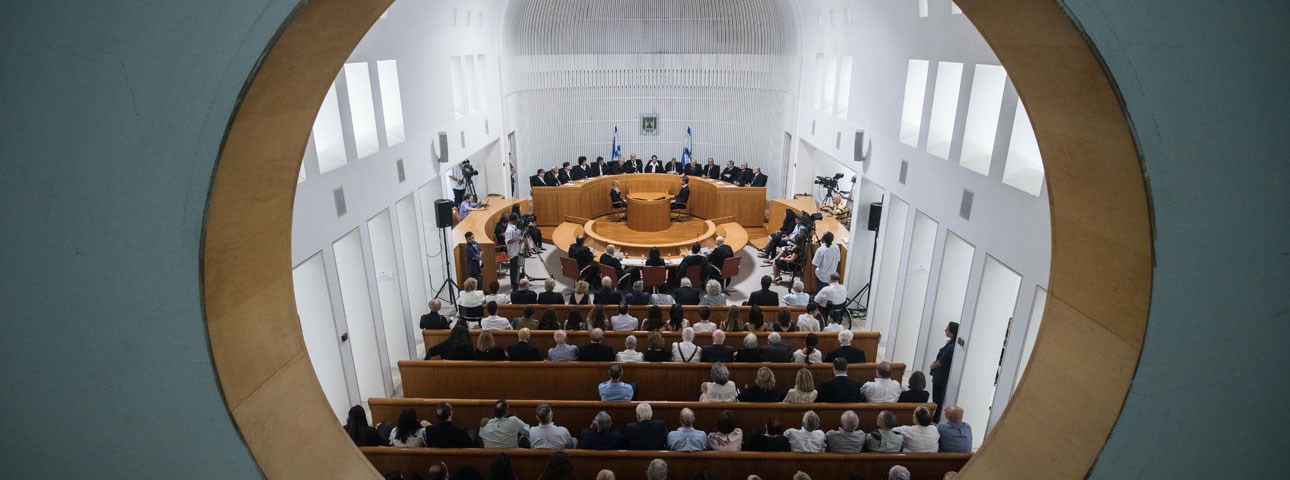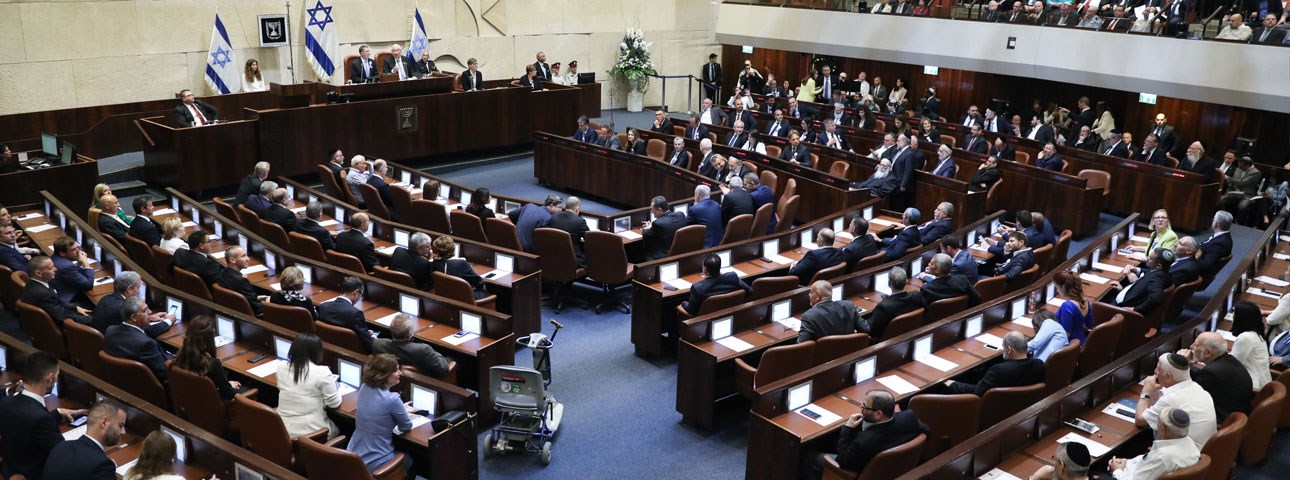

Publications Regarding The Judicial Overhaul
Articles

A Note to Members of Knesset: Immunity Does Not Apply to Police Investigations
Written By: Prof. Suzie Navot, Dr. Moran Kandelshtein-Haina
Though Members of Knesset are granted immunity from prosecution under the law, legal precedent makes clear that this immunity does not apply to the stage of criminal investigations.

The Case for Nuance and Complexity in Israel's Polarized Politics
Written By: Prof. Benjamin Porat
Now more than ever, Israelis must be empowered to form complex, non-sloganeering positions that may not fit superficially into existing frameworks. This is the key to breaking free from the simplistic, dichotomies and gridlock in which our discourse is trapped.

Back Into the Abyss: Israel’s Government Fires Attorney General, Supreme Court Blocks the Move
Written By: Prof. Yuval Shany, Prof. Amichai Cohen
The firing of the AG constitutes another escalation in the current government’s approach to the domestic rule of law institutions.

The Hidden Lesson of Israel's Iran Victory
Written By: Yohanan Plesner
Israel’s victory over Iran was not just a triumph of military strategy—it was a testament to democracy and moral clarity. In a region plagued by autocracy, it is Israel’s enduring commitment to freedom, pluralism, and the rule of law that gives it the resilience and strength to prevail.

Dismissing the Attorney General
Written By: Dr. Guy Lurie, Dr. Amir Fuchs
This paper describes the procedure that has been laid out for dismissing the attorney general, its recent revision, and explains why the decision by the Netanyahu government to fire the attorney general at the current time is legally invalid.

Chaos in the Courtroom, Clarity on the Bench
Written By: Prof. Suzie Navot
Everything you need to know about yesterday's High Court hearing on Netanyahu's efforts to fire Shin Bet Director Ronen Bar went.

Key points to keep in mind in relation to the Supreme Court hearing on Ronen Bar's firing
Written By: Prof. Suzie Navot
IDI VP of Research Prof. Suzie Navot shares key points to keep in mind in relation to the Supreme Court hearing on Ronen Bar's firing.

Arab Representation in the Judiciary is Under Threat
Written By: Adv. Lital Piller
By shifting power from professional bodies to political appointees the new law restructuring the Judicial Selection Committee is likely to reduce Arab representation and exacerbate their exclusion.

The Government Against the Rule of Law
Written By: Dr. Guy Lurie
The Israeli government's current efforts to dismiss the head of the director of the Shin Bet and the Attorney General, alongside its attempt to restructure the Judicial Selection Committee, reflect a broader shift toward subordinating legal and security institutions to political authority, raising concerns about the erosion of the rule of law and the future of democratic governance in Israel.

Explainer: The Prime Minister’s Decision to Pursue the Dismissal of the Head of the Shin Bet
Written By: Prof. Amichai Cohen, Dr. Eran Shamir-Borer
On March 20, 2025, Israel’s government voted in favor of Prime Minister Benjamin Netanyahu’s decision to dismiss Ronen Bar, head of the Shin Bet, citing "growing distrust" in the security chief. The following document answers key legal questions around this announcement.

Exploiting the Public's Distraction to Pursue the Judicial Overhaul
Written By: Dr. Guy Lurie
Amidst the return to fighting in Gaza, the Minister of Justice is taking advantage of the public's eye being off the ball to hastily overhaul Israel's judicial system.

Putting Knesset Members Above the Law
Written By: Dr. Amir Fuchs
The amendment to the Immunity Law proposed by MK Tally Gotliv would allow MKs to grant themselves immunity from criminal and civil prosecution, undermining equality before the law and creating inherent conflicts of interest that disproportionately protect coalition members from accountability.

Does Shin Bet chief Ronen Bar's dismissal endanger Israeli democracy?
Written By: Prof. Amichai Cohen
Prime Minister Netanyahu has informed Israel Security Agency Shin Bet Director Ronen Bar of his decision to fire him. Netanyahu cited his mounting lack of confidence in Bar as grounds for his dismissal. KAN's Mark Weiss spoke about the prime minister’s decision to dismiss Ronen Bar with Prof Amichai Cohen, a Senior Fellow at the Israel Democracy Institute.

Four Comments on the Decision to Dismiss the Head of the Shin Bet
Written By: Prof. Suzie Navot
On March 16, 2025, Prime Minister Netanyahu announced his intention to bring the dismissal of Ronen Bar, the head of the Israeli Security Agency (Shin Bet), Israel's internal security service, to a vote of the full cabinet. Though not a perfect comparison, the Shin Bet is often seen as comparable to the FBI in the US.

Majority of Israelis Think PM Netanyahu Should Accept Responsibility for Oct 7 and Resign – Now or After the War
Written By: Prof. Tamar Hermann, Dr. Lior Yohanani, Yaron Kaplan, Inna Orly Sapozhnikova
Around half of Israelis think that it's unlikely that President Trump will turn away from Israel, if he thinks its policies are not aligned with US interests, while close to 40% think chances are fairly high or high; 73% of the total sample support continuing with the second stage of the hostage agreement and securing the release of all the hostages.

Israel and the Freedom in the World Report: A Pattern of Continuing Decline
Written By: Dr. Assaf Shapira, Prof. Ofer Kenig
In just over a decade, Israel’s score in the report published by Freedom House has fallen by 8 points, a decline that now puts it alongside countries such as Brazil and Namibia.

Israel’s Renewed Judicial Overhaul
Written By: Prof. Yuval Shany, Prof. Amichai Cohen
The battle over Israel’s legal system has resumed, threatening judicial independence.

The Dangerous Politicization of Judicial Appointments
Written By: Dr. Amir Fuchs
Changes in the composition of the Judicial Selection Committee threaten the independence of the judicial system. The current proposals would lead to a complete politicization of appointments to all courts and should be blocked.

What Happens When Israel’s Minister of Justice Refuses to Cooperate with the Chief Justice?
Written By: Dr. Guy Lurie
IDI's Dr. Guy Lurie explains the far-reaching implications of non-cooperation between the two leaders of Israel's judiciary.
"It's the everyday citizens who are sure to pay the price."

The Danger of a Politicized Judicial Selection Committee
Written By: Dr. Guy Lurie
Dr. Guy Lurie, a Research Fellow at IDI's Democratic Values and Institutions Program, offers a breakdown on the risks of politicization inherent in the recent proposal by Minister of Justice Levin and Foreign Minister Sa'ar to reform the Judicial Selection Committee.

A Large Majority of Israelis Support Proceeding to the Second Stage of the Ceasefire Agreement
Written By: Prof. Tamar Hermann, Dr. Lior Yohanani, Yaron Kaplan, Inna Orly Sapozhnikova
More Israelis (43%) think Hamas' interests have been served better in the first stage of the ceasefire agreement than Israel's (21%); however, a majority still supports proceeding to the next stage (70%) if the first stage is completed as agreed; a vast majority of Israelis (72.5%) think the ceasefire agreement was achieved thanks to President Trump's intervention.

Justice Minister: Won't Cooperate with New Supreme Court President | Dr. Guy Lurie on Kan English Podcast
Written By: Dr. Guy Lurie
Dr. Guy Lurie, Senior Researcher at the Israel Democracy Institute, speaks to KAN reporter Naomi Segal following the election of Justice Isaac Amit to Chief Justice and the Minister of Justice's statement that he does not recognize the appointment and will not cooperate with him.

A Chief Justice Under Attack
Written By: Prof. Suzie Navot
While the selection of Justice Amit as President of the Supreme Court was done in accordance with the relevant legislation, the Justice Minister has declared the procedure "fundamentally improper and illegal." His refusal to recognize the selection creates a precedent that may lead to the deterioration of the authority of other institutions. This is what the beginning of a constitutional crisis looks like.

A Legitimate Supreme Court President
Written By: Dr. Guy Lurie
Following Justice Isaac Amit's selection as Supreme Court President, Minister of Justice Levin immediately declared he would refrain from any collaboration between them, describing the selection process as unlawful. This announcement is both factually incorrect and a serious dereliction of his duties.

Ministers Levin and Saar's Proposed Changes to the Judicial Selection Committee
Written By: Dr. Guy Lurie
Justice Minister Yariv Levin and Foreign Minister Gideon Sa’ar presented their proposed changes to the composition of the Judicial Selection Committee (JSC) as a compromise aimed at achieving a gradual change in the judicial selection process, but many constitutional experts worry that the plan will have dire consequences resulting in the politicization of Israel’s judicial selection process.

The Politicization Revolution in Judicial Selection
Written By: Dr. Guy Lurie
The Sa'ar-Levin proposal represents a shift from prioritizing professional qualifications in the Judicial Selection Committee to emphasizing political loyalty as the basis for judicial appointments. This risks eroding judicial independence, compromising professionalism, and incentivizing ideological extremism.

“Democracy on the Frontlines” Conference Survey
Written By: The Israel Democracy Institute
Only a small minority of the Israeli public (8%) think that the judicial overhaul should be the government’s highest priority today; The majority of respondents (53%) support keeping the current structure of the Judicial Selection Committee. Only around a quarter (27%) suppor adding politicians to the Committee.

IDI Experts on the New Levin-Saar Proposal to Change the Judicial Selection Committee
Written By: Israel Democracy Institute
In a statement following publication of the new initiative released by Minister of Justice Yariv Levin and Foreign Minister Gideon Saar, IDI experts weigh in on the new proposal to change the Judicial Selection Committee.

Does the Minister of Justice Have Immunity?
Written By: Prof. Suzie Navot, Dr. Moran Kandelshtein-Haina
In response to a petition filed against him regarding the intentional delay in appointing a president of the Supreme Court, Minister Levin claimed that it is impossible to sanction him because he enjoys “substantive immunity.” A closer examination of the law reveals that this is not the case.

Coalition members press for attorney general's dismissal | Dr. Amir Fuchs on Kan English Podcast
Written By: Dr. Amir Fuchs
Dr. Amir Fuchs, Senior Researcher at the Israel Democracy Institute, speaks to KAN reporter Naomi Segal about the renewed coalition push to advance the judiciary overhaul and dismiss the attorney general.

“If I am not the one deciding – then we will change the rules”
Written By: Prof. Suzie Navot
In September, the Supreme Court ordered the Minister to fulfill his duty to convene the Committee because the system cannot be paralyzed. Since then, the Minister has convened the committee, but refused to appoint the Supreme Court President. Now, the Court has ordered him to do so.

New Bill Proposed Expands the Criteria for Disqualification of Electoral Lists
Written By: Dr. Amir Fuchs
A new bill proposes to amend Basic Law: The Knesset, by expanding the criteria that would disqualify candidates and lists from participating in elections based on minimal and even past expressions, interpreted as sympathy or support for armed struggle of an enemy state or terrorist organization.

Conversations with Cosgrove: Israel's Democracy with Yohanan Plesner
Written By: Yohanan Plesner
Rabbi Cosgrove discusses the current political climate in Israel with Yohanan Plesner.

Understanding the Supreme Court's Ruling: Selection of the Supreme Court President
Written By: Dr. Guy Lurie
The Israeli Supreme Court recently issued a pivotal ruling, instructing the Minister of Justice to convene the Judicial Selection Committee and select a new President of the Supreme Court. This decision come after nearly a year in which this permanent position has remained vacant.

Appointing a President for the Supreme Court: Justice Levin's Actions Contravene the Law
Written By: Prof. Suzie Navot
After the Minister of Justice Yariv Levin refrained from convening the Judicial Selection Committee to appoint a Supreme Court President, the Supreme Court ruled that the Committee must convene to appoint a President—Prof. Suzie Navot analyzes the Court's decision.

Netanyahu and His Ministers Have Driven Israel to the Verge of a Constitutional Crisis
Written By: Dr. Amir Fuchs
Disregard of the Attorney General’s authority to interpret the law by several government ministers is leading Israel toward a constitutional crisis.

The Role of the Attorney General and Government Conduct
Written By: Dr. Guy Lurie, Adv. Anat Thon Ashkenazy, Adv. Daphne Benvenisty
In recent days the Attorney General has issued several warnings that decisions are being made using "flawed work processes." This explainer provides an overview of the role and importance of the Attorney General in Israeli democracy, and the current criticism directed by the AG at the government.

Judicial Selection in Israel in the Aftermath of the Judicial Overhaul
Written By: Dr. Guy Lurie
With the outbreak of the war in October 2024, the Prime Minister announced that he was halting all legislation relating to the judicial overhaul, however, various government actions raise questions regarding its intentions in relation to the overhaul and whether it might be trying to advance it by other means beyond legislation.

The United Nations’ Warning about Undermining the Independence of the Judiciary
Written By: Dr. Guy Lurie
The UN report paints a disturbing picture in which countries experience “autocratization”—an erosion of the foundations of democracy—through actions that undermine the judicial system’s independence. In Israel, the current government is aiming to undermine judicial independence in order to consolidate its power and authority at the expense of individual rights and the rule of law.

The Judicial Overhaul and Anti-Democratic Initiatives - Part II
Written By: Adv. Anat Thon Ashkenazy, Adv. Daphne Benvenisty
IDI experts outline the initiatives and measures undertaken by the government that, taken together, constitute a concentrated effort undermine Israel's democratic institutions. At the core of these efforts is a dramatic attempt to weaken the status of the Attorney General; increased politicization of the police; continued undermining of the independence of the judiciary and more.

“Unity” as a Means to Weaken the Judicial System
Written By: Dr. Guy Lurie
While the Israeli public has been focusing on the war and on the hostages in Gaza, the government—led by the minister of justice—has been preparing an assault on the independence of the judicial system.

Netanyahu Government Gets Low Grades Across Various Wartime Issues
Written By: Prof. Tamar Hermann, Dr. Lior Yohanani, Yaron Kaplan
Across the issues of US-relations, the war in Gaza, evacuees from the south and the north, fighting Hezbollah, and public diplomacy efforts abroad—both Jewish and Arab Israelis give the government low grades.

Economic Implications of Drafting Ultra-Orthodox in Israel
Written By: Gabriel Gordon
In new research, IDI experts Shlomit Ravitsky Tur-Paz and Gabi Gordon find that conscripting even a small percentage of eligible Haredi men would save the Israeli economy billions of shekels annually. They found that drafting even 20% of Haredi men would significantly reduce the number of days necessary for reserve duty and save 2.5 billion shekels in budgetary expenses by 2050. Full conscription of the ultra-Orthodox men would eliminate the need for reserve duty by 2045 and save the Israeli economy between 8-10 billion shekels.

The Judicial Overhaul and Anti-Democratic Initiatives
Written By: Adv. Anat Thon Ashkenazy, Adv. Daphne Benvenisty
Judicial overhaul initiatives, along with other anti-democratic measures, have continued to be promoted by the government and the coalition in the Knesset. This document outlines the various actions taken in government that weaken the Israeli judiciary and democracy at large.

The Invisible Safeguards of Judicial Independence in the Israeli Judiciary
Written By: Dr. Guy Lurie
The Israeli democracy regulates the operation of the judiciary through the constraints of formal rules that check the political actors, the individual judges, and the judiciary. Yet beyond these formal rules, informal institutions and practices are sometimes equally important in the operation of the judiciary, as they are in any constitutional system. This article discusses informal institutions that are important in the operation and independence of the Israeli judiciary.

The HCJ Strikes Back: Israel’s Supreme Court Pulls the Plug on “Judicial Reform”
Written By: Prof. Amichai Cohen, Prof. Yuval Shany
Two judgments issued by the Supreme Court in the first week of 2024 deal a decisive blow to the Netanyahu government’s efforts to radically rebalance the branches of government.

Can a unified Israel rise from the ashes of the Hamas war?
Written By: Yohanan Plesner
While we entered this war more divided than ever – and with large numbers even saying that they believed civil war to be a possibility – Israelis today are united in their determination to win.

What Was the Supreme Court’s Ruling on the Revocation of the Reasonableness Doctrine? Eight Key Points
Written By: Prof. Amichai Cohen, Dr. Amir Fuchs, Dr. Guy Lurie
The Supreme Court's ruling to strike down the amendment made to the Basic Law: The Judiciary and reinstate the Standard of Reasonableness is a landmark decision on an issue that has been exceptionally divisive within Israeli society. Will this lead to a constitutional crisis? 8 Key points from IDI's experts examining the court's decision.

The Verdict is in: Checks and Balances are Here to Stay
Written By: Prof. Suzie Navot
This decision refocused our attention not only on the specific law it struck down but also on the unfinished business of completing our country’s constitutional framework

The Supreme Court Ruling on Canceling the Reasonableness Clause—Implications
Written By: Dr. Amir Fuchs
The Supreme Court ruled that the Court has authority to perform judicial review on Basic Laws, and that an intervention was necessary in the case of the amendment to the Basic Law: The Judiciary revoking the Standard of Reasonableness. What are the implications?

Israel Democracy Institute Statement on Israel's Supreme Court Ruling
The Israel Democracy Institute issued the following statement on the High Court of Justice’s decision to strike down the amendment passed in July to the Basic Law: The Judiciary, eliminating the Court’s use of the Reasonableness Standard.

Unreasonableness and the Judicial Overhaul - Survey Analysis
Written By: Dr. Or Anabi
Data indicates that less than a third of the public supports barring the Supreme Court from intervening in decisions by politicians or public officials.

Doing Away with the Standard of Extreme Unreasonableness
Written By: Prof. Amichai Cohen
The coalition has voted to amend Basic Law: The Judiciary and repeal the Standard of Reasonableness used to review government decisions that are deemed to be extremely unreasonable. On September 12th, the Supreme Court will hear petitions against the constitutionality of this move.

Israel’s Unfinished Democracy
Written By: Yohanan Plesner
As the international community ponders Gaza’s post-war future, Israelis are increasingly focused on what the ‘day after’ holds for their politics and society.

Israel's War Cabinet: A Brief History of War Powers and Institutional Ambiguity
Written By: Prof. Amichai Cohen, Prof. Yuval Shany
The Israeli war cabinet and the complex institutional structure related to war informs greatly on Israel’s decision-making.

The Justice Minister’s Decision to Convene the Judicial Selection Committee
Written By: Dr. Guy Lurie
On November 5, 2023, Minister of Justice Yariv Levin notified the High Court of Justice that he will convene the Judicial Selection Committee within 15 days. Selecting judges is not possible in such a short time frame, so we will have to wait and see whether this decision leads to the completion of judge appointments to the vacant positions.

Israel needs a strong supreme court now more than ever
Written By: Dr. Guy Lurie
Justice Hayut's retirement from the presidency of the Supreme Court was well-known in advance, however, the Minister of Justice's refusal to convene the Judicial Selection Committee leaves Israel with a temporary replacement during a national emergency.

30 years after the Oslo Accords: A large share of Israelis think it was wrong for Israel to enter the process
Written By: Prof. Tamar Hermann, Dr. Or Anabi
As we mark the 30th anniversary of the Oslo Accords this month, a larger share of Jewish respondents think it was incorrect to enter into that process, while the percentage of respondents who selected "don't know" was exceptionally large.

The Supreme Court Hearing on Reasonableness: Law without Enforcement
Written By: Prof. Suzie Navot
On the question of Unreasonableness, it appears that the dispute is not only between the Knesset and the Supreme Court, but also among the justices themselves. There are many possibilities, but only one ruling, which will be handed down no later than mid-January 2024.

Following the Supreme Court Reasonableness Hearing: Where are we Now?
Written By: Yohanan Plesner , Prof. Yuval Shany
Yohanan Plesner, president of IDI and Prof. Yuval Shany, a Senior Fellow at the Center for Democratic Values and Institutions met with reporters to discuss the historic Supreme Court hearing on the repeal of the reasonableness doctrine.

Three Big Cases in Israel's September to Remember
Written By: Prof. Amichai Cohen, Prof. Yuval Shany
Three petitions before the Israeli Supreme Court are transforming the usually slow month of September into a pivotal one in Israel’s ongoing judicial crisis.

Israelis are deeply divided on the upcoming Supreme Court hearings
Written By: Prof. Tamar Hermann, Dr. Or Anabi
41.5% of coalition voters and 6% of opposition voters said that the Court lacks the authority to perform judicial review over Basic Laws passed by Knesset. 73% of Israelis agree that in order to bridge the divisions between the political camps, attempts should be made to reach a compromise.

The Supreme Court Hearing on the Revocation of the Reasonableness Doctrine
Written By: Prof. Amichai Cohen
On September 12, 2023, an unprecedented panel of 15 Supreme Court Justices will convene to hear petitions requesting to strike down the recent amendment to the "Basic Law: The Judiciary."

The Judicial Selection Committee must be convened now
Written By: Dr. Guy Lurie
The Judicial Selection Committee has not met for more than a year, and during this period, various positions held by judges have been vacated.

Judicial Reform – What Comes Next? PART 2 OF 2
Written By: Prof. Yuval Shany,
In the second part of this two-part episode, Jack Omer-Jackman speaks to renowned Israeli legal scholar and IDI expert Professor Yuval Shany to discuss the Supreme Court’s upcoming deliberations on the legislation annulling reasonability; the significance of basic laws; the impact of reservists’ protests on Israel’s military preparedness and the role of a citizen army in a democracy.

Judicial Reform – What Comes Next? PART 1 OF 2
Written By: Prof. Yuval Shany,
In the first part of this two-part episode, Jack Omer-Jackman speaks to renowned Israeli legal scholar and IDI expert Professor Yuval Shany to discuss the Supreme Court’s upcoming deliberations on the legislation annulling reasonability; the significance of basic laws; the impact of reservists’ protests on Israel’s military preparedness and the role of a citizen army in a democracy.

The government must stop the judicial legislation to prevent further damage to the economy
Written By: Prof. Karnit Flug, Prof. Jacob Frenkel
Earlier this year, we published an article warning against the dangers of the judicial reforms, to our regret, many of the negative developments about which we warned at the beginning of the year have already come to pass.

Different Laws for Courts & Knesset Would Spell Disaster
Written By: Prof. Gideon Rahat,
Israel’s political system remains in turmoil as the Supreme Court prepares to hear appeals concerning the refusal of the Justice Minister to convene the Judicial Selection Committee and the constitutionality of the unreasonableness amendment at the beginning of September.

Populism as an Existential Threat in Israel
Written By: Prof. Gideon Rahat
In an effort to create uniformity, populists are ready to destroy the state.

A majority of Israelis think that Israel is currently in a state of emergency
Written By: Prof. Tamar Hermann, Dr. Or Anabi
The July 2023 edition of the Israeli Voice Index finds that 58% of Israelis believe the country is in a "state of emergency." Only a small minority of Israelis believe that IDF reservists, who fail to report for duty in protest of the judicial overhaul, should be dismissed.

What Matters Now to former Bank of Israel governor Karnit Flug: The economy, stupid
Written By: Prof. Karnit Flug,
Prof. Karnit Flug, IDI's VP of Research, William Davidson Senior Fellow and a former governor of the bank of Israel offers data on the current effects of the controversial judicial overhaul and projections for more ripples as the high tech industry begins to unravel.

The Supreme Court of Israel: A Professional or Political Institution?
Written By: Dr. Guy Lurie, Dr. Amir Fuchs
Comparing Israel's Supreme Court to America's Supreme Court. 64 Israeli legislators, a slim majority of the Knesset, voted on Monday, July 24, to amend one of Israel's Basic Laws, and in so doing, they took away the Israeli Supreme Court's ability to strike down decisions that it finds "unreasonable in the extreme.

Explainer: Israel's High Court of Justice and the Incapacitation Law
Written By: Dr. Amir Fuchs
The term "incapacitation" refers to a situation in which a government official is unable to perform their duty. The previous version of the law did not detail what constitutes incapacitation, nor who is authorized to declare incapacitation. The current version is accused of being personal and political.

Protests are Necessary—But So Is Decentralization
Written By: Dr. Assaf Shapira
When Israeli liberals depend solely on the Supreme Court for checks and balances, they are taking a big risk. It is essential to add veto points as human rights in Israel should not depend on the Supreme Court alone - decentralization of government is key.

Haaretz Weekly: What Comes Next?
Written By: Yohanan Plesner ,
Yohanan Plesner, president of the Israel Democracy Institute, joins Haaretz Weekly host Allison Kaplan Sommer to discuss what comes next, after the Knesset passed the first law in its planned judicial overhaul.

The Economic Implications of the Coalition’s Legislative Initiatives
Written By: Prof. Itai Ater, Dr. Tzachi Raz, Dr. Yannay Spitzer
This paper seeks to elucidate the economic consequences of the judicial overhaul. It approaches the topic through the lens of the new institutional literature in economics, which has extensively addressed the link between democratic institutions and the economy in recent decades.

The Day After Reasonableness
Written By: Prof. Suzie Navot
The coalition launched the first stage in its judicial overhaul. The process by which the amendment to the Basic Law: The Judiciary was passed, releasing the government and its ministers from the duty to act with reasonableness, is the best possible evidence for what we can now expect.

The Lawfare Podcast: The Judicial Revolution Is Here
Written By: Prof. Yuval Shany, Prof. Amichai Cohen
The first phase of Israel's judicial overhaul is now law. Huge numbers of people are in the streets, reservists are resigning, the stock market is tanking, and Lawfare Editor-in-Chief Benjamin Wittes assembled an all-star panel to talk about it, including IDI's Prof. Amichai Cohen and Prof. Yuval Shany.

The IDF Reservists Protest against the Judicial Overhaul – Explainer
Written By: Dr. Eran Shamir-Borer, Adv. Mirit Lavi
The protest by reserve soldiers has sparked a fierce political and public debate in Israel. Who are these reservists, what are their motivations and what are the implications of their choice? Find the answers here.

From All-Out Assault to Salami Slicing Tactics: Israel’s Crisis Continues
Written By: Prof. Amichai Cohen, Prof. Yuval Shany
The Israeli governing coalition is now “only” trying to strip the Supreme Court of its power to conduct reasonableness review of cabinet decisions.

In Anticipation of the Knesset’s Vote on the “Reasonableness Standard” – What Happens Next?
Written By: Yohanan Plesner
With the Knesset set to hold its final vote on curtailing the “reasonableness standard,” what happens next? What are the implications of removing this type of oversight on governmental decisions, and is there still a possibility for compromise ahead of the vote?

Reasonableness in the Crosshairs
Written By: Prof. Suzie Navot
Tel Aviv-based journalist and Israel Policy Forum Policy Advisor Neri Zilber hosts Prof. Suzie Navot, the vice president for research at the Israel Democracy Institute, to analyze the renewed push by the Netanyahu government to overhaul Israel's judicial system.

Not Unreasonable - Irresponsible
Written By: Dr. Guy Lurie
The law is clear. The Minister is obligated to convene the committee when judicial vacancies appear. By evading this responsibility, he is failing in his duty.

On Protest and Enforcement: An International Perspective
Written By: Prof. Yuval Shany
The protest against the government legislation is clearly covered by the protections granted by international law to the right to assembly. The position of the Attorney General of Israel strikes an appropriate balance between exercising the right to demonstrate and protecting competing rights and interests.

Flash Survey: Most Israelis Assess that the Protest Movement Has Delayed Progression of the Judicial Overhaul
Written By: Prof. Tamar Hermann, Dr. Or Anabi
Almost a quarter of Israelis have participated in some form of protest, a majority assess that the protest movement has delayed the progress of the judicial overhaul and Likud voters are divided on the question of continuing its implementation.

The Reasonableness Issue Requires Serious, Informed, and Consensual Discussion
Written By: Prof. Suzie Navot
Only a government that wishes to make extremist and corrupt decisions would be afraid of the reasonableness test. While the test would certainly benefit from discussion of the framing of its boundaries and application, the legislation currently on the table hands the government unrestrained power.

No professionalism, no expertise – and no women
Written By: Adv. Anat Thon Ashkenazy
The Authority for the Advancement of Women's Status and agencies like it are being gutted along with protections for women

Massive Protests Show Israelis Understand Democracies Die Gradually
Written By: Dr. Nadiv Mordechay,
In Israel, the equivalent of 70 million Americans have gone out to protest the Netanyahu government's attempt to break the country's constitutional order. Populist politics is at war with the mainstream public opinion that it claims to represent.

Eliminating the Standard of Reasonableness Would be Another Step towards Giving the Government Unlimited Power
Written By: Prof. Yuval Shany
Abolishment of the standard of unreasonableness would lead to a further concentration of power in the hands of the executive – a power that is already greater in Israel than in many other democracies.

Six Months In, Government Gets Low Grades in All Areas
Written By: Prof. Tamar Hermann, Dr. Or Anabi
As the government completes its first six months in office respondents were asked to rate its performance in various fields.

The Courts Use Reasonability in Moderation
Written By: Dr. Guy Lurie
Dr. Guy Lurie, IDI expert discusses the court's use of the Standard of (Extreme) Unreasonableness and current status of the judicial overhaul.

Nationalism and Liberalism: How Reality Surprises Theory
Written By: Prof. Daniel Statman
While nationalism and liberalism appear to contradict, under certain conditions, nationalistic loyalty strengthens the commitment to liberal and democratic values.

The Complexities of the Judicial Overhaul in Israel
Written By: Dr. Jesse Ferris
Dr. Jesse Ferris with New York Times' Bret Stephens and Prof. Avi Bell discuss the complexities of the judicial overhaul and its significance on the future of Israel on Sapir Conversations podcast.

Religiosity Major Influence on Attitude Toward Judicial Overhaul
Written By: Dr. Itamar Yakir
The reform proposal and the resulting protests brought to light and to a large extent also created conflicts on religious and ethnic grounds. The findings of this research reveal a strong relation between levels of religiosity and support or opposition to the judicial overhaul.

Two States for One People? Israelis Want to Stay United
Written By: Prof. Tamar Hermann, Dr. Or Anabi
Trust in the Supreme Court remains steady, while the share of Israelis who trust the Knesset has almost doubled since last year. Opinions on the likelihood of the government completing its term are fairly evenly divided in the Jewish public.

Overhauling the Supreme Court
Written By: Dr. Guy Lurie
Dr. Guy Lurie in an in-depth interview with The Jewish Time podcast's Jeff Silberblatt on the attempted judicial overhaul and its implications on Israel's future.

Low Prospects for a Compromise Between Opposition and Coalition
Written By: Prof. Tamar Hermann, Dr. Or Anabi
This month we found a slight rise in optimism regarding both the future of democratic rule in Israel and the future of national security. However, almost two-thirds of Arab Israeli respondents replied they are worried that they or family members will be victims of violent crime.

After the judicial reform, the electoral process is next
Written By: Prof. Ofer Kenig
When there are no restraints on what the government can do, the road will be open to “adjustments” (tricks) and “reforms” (schemes and conspiracies) in the electoral process.

Israel Is Dangerously Polarized
Written By: Dr. Jesse Ferris
Is Israel’s split into pro-and anti-Bibi camps a healthy manifestation of exuberant pluralism—or the symptom of a dangerous and potentially unbridgeable polarization?

Judicial Overhaul and Israeli Households
Written By: Daphna Aviram-Nitzan
The impact of the proposed changes to the judicial system on the financial balance of Israeli households: analysis of the M.O.F risk scenarios by income deciles

Let’s heed the prophets of Israel
Written By: Yohanan Plesner
The Declaration of Independence expresses a deep commitment to freedom, justice and peace in the spirit of the vision of the Biblical prophets, those semi-tragic figures who rebuked the people and their leaders for their behavior. Or in other words, the gatekeepers.

Three Supreme Court Justices on Israel's Judicial Overhaul
Three former supreme court justices from Israel, the United States, and Canada—Dorit Beinisch (Israel), Stephen Breyer (US), and Rosalie Abella (Canada)— assembled at the 92nd Street Y in New York for a timely conversation on the complex legal and political drama unfolding in Israel.

Appointment of Judges to High Courts in Democratic Countries: A Comparative Study
Written By: Prof. Amichai Cohen, Dr. Guy Lurie
The research examined 42 countries included all the OECD member states along with other leading democratic countries.

The Role of Legal Advisors - Explainer
Written By: Dr. Guy Lurie, Adv. Daphne Benvenisty
Transforming legal advisors into political appointees will thwart the dual purpose of their role- helping the ministry implement its policy, while maintaining the rule of law.

National Mood Unrestful
Written By: Prof. Tamar Hermann, Dr. Or Anabi
This month saw a decline in optimism regarding both the future of democratic rule in Israel and the future of national security. 21% of Israelis have participated in at least one act of protest against the judicial reforms.

Briefing by IDI President Yohanan Plesner Following the Suspension of the Judicial Overhaul
Briefing by IDI President Yohanan Plesner Following the Suspension of the Judicial Overhaul.

Statement by the Israel Democracy Institute on the Prime Minister’s Decision to Suspend the Judicial Overhaul
The temporary suspension of the judicial overhaul provides an opportunity for the Prime Minister, as well as the leaders of the coalition and the opposition, to turn this crisis into a historic constitutional opportunity.

No Other Democracy in the World
"“In Ireland we have a judicial appointment commission which is mixed, but there are no politicians on the commission and there never has been.” Alan Shatter, Former Minister for Justice, Equality and Defense (Ireland)

How a once-cautious Benjamin Netanyahu came to lead the most radical coalition in Israel’s history
Written By: Prof. Ofer Kenig
How can Netanyahu — a U.S.-educated and respected world leader who was cautious in his approach to building previous coalitions, and was once respectful of Israeli democratic institutions — support such a dangerous plan? Was the “writing on the wall” earlier on in his lengthy tenure?

There’s no ‘compromise’ in the coalition’s play for unlimited power
Written By: Prof. Suzie Navot
Slowing the overhaul is a sham. It’s still a hostile takeover of the Supreme Court and its ability to restrain the coalition

How is this the “End of Democracy?"
Written By: Prof. Yotam Margalit
Precisely what legal clause Levin and company will choose to achieve their goals isn’t really important, but the larger implications certainly are.

Israel is Still a Free Country – But Now With a Warning Sign
Written By: Dr. Assaf Shapira
A top democracy index hasn't yet ranked Israel with Hungary. That will change if the majority becomes all powerful

Everyone’s Talking from a “Position”—Except for Us
Written By: Prof. Yuval Feldman
The concepts of a “position” and “conflict of interest” crop up frequently in the discussion of the judicial revolution - that is why the facts are so important

Statement by the Israel Democracy Institute on President Herzog’s Proposal
The Israel Democracy Institute congratulates President Isaac Herzog on his extraordinary efforts. While the President’s plan contains some problematic elements, if it were to be adopted in its entirety as a package, we would support it because it safeguards our democracy and bolsters key elements of our constitutional foundations.

Government of the people means government of ALL the people
Written By: Prof. Gideon Rahat
The current battle in Israel is not between left and right. It is being waged between those who embrace democracy and those who want to make one last use of democracy to institute majority rule.

Fighting the Judicial Reform for Zionism
Written By: Dr. Amir Fuchs
The battle against the judicial overhaul is not being waged only to safeguard democracy, it is also a fight to preserve Zionism itself.

Constitutional Reform in Israel - How should it be done?
Written By: Yohanan Plesner
President of IDI, Yohanan Plesner, describes the judicial reforms that would make Israeli democracy stronger and transform a moment of crisis into an historical constitutional opportunity.

The Judicial Revolution and Arab Society in Israel
Written By: Adv. Oded Ron, Dr. Muhammed Khalaily
Reducing the possibility of invalidating legislation and the rest of the initiatives will further undermine the protection of the rights of the Arab minority in Israel, whose trust in the judicial system has steadily decreased in recent years - but is still high in relation to trust in other institutions.

Israel's Death Penalty, Haredi Ideology and Yisrael Beytenu's Role
Written By: Eliyahu Berkovits
The death penalty for terrorists bill may pass the Knesset in what may be a dream come true for some and a horrific nightmare for others.

The Levin-Rothman plan 101 (yes, this will be on the test)
Written By: Dr. Dana Blander
Some actual facts for college and university students whose teachers are under attack for teaching actual facts

The Ramifications of the Judicial Reform for the Status of Women in Israel
Written By: Adv. Anat Thon Ashkenazy
A professional opinion by the Israel Democracy Institute presented in advance of the session of the Knesset Committee on the Status of Women and Gender Equality on February 20, 2023

What is “Incapacity” and what are the Implications of a Prime Minister’s Incapacity?
Written By: Dr. Amir Fuchs
When is the Attorney General empowered to declare that the Prime Minister is incapable of fulfilling his duties? When does temporary incapacity become permanent? What has the Court ruled in the past about a declaration of incapacity concerning Benjamin Netanyahu?

Making Ministry Legal Advisors Political Appointees Goes Against Jewish Law
Written By: Prof. Benjamin Porat
The question of how much power the government should wield was one that generations of halakhic decisors (poskim) worked to curtail.

The Judicial Reforms Implications on Israel's Standing in the International Courts
Written By: Prof. Yuval Shany
The Israeli judicial system’s independence and professionalism protect IDF commanders from prosecution in international courts. A close look at the planned judicial overhaul leads to the conclusion that if implemented it would increase the risk to Israeli citizens and make it harder for the country to protect them in the future.

Death Penalty for Terrorists Bill is Not Constitutional and Will Deal Grievous Harm to Israel
Written By: Prof. Yuval Shany, Prof. Mordechai Kremnitzer, Prof. Amichai Cohen, Dr. Amir Fuchs
Israel has only used capital punishment twice, with the last time being in 1962 when Nazi war criminal Adolf Eichman was put to death. IDI experts weigh in on a bill that would make capital punishment mandatory for convicted terrorists.

How Often Does the Supreme Court Invalidate Legislation?
Written By: Prof. Yuval Shany, Dr. Guy Lurie
In recent years, there have been attempts to enact the “override clause” in Israel, a legal provision that would enable the Knesset to override the Supreme Court’s rulings in cases in which it strikes down legislation. This week the Constitution, Law and Justice Committee is discussing a draft of such a law.

Why are Liberal Israelis so Terrified of Bibi’s Judicial Reforms?
Written By: Prof. Amichai Cohen
The proposed legislation evicerates the only check on executive and legislative power in Israel.

No More Legal ‘Gatekeepers’? Plans to Downgrade the Status of Government Legal Advisers in Israel
Written By: Prof. Amichai Cohen, Prof. Yuval Shany
Downgrading the independence of government legal advisers is not among the highest-profile proposals to reform the Israeli legal system being advanced by Israel’s new right-wing government, but weakening the status of government legal advisers is actually an important and troubling part of the government’s package of proposed reforms.

Only a Minority of Israelis Support the Proposed Judicial Overhaul
Written By: Prof. Tamar Hermann, Dr. Or Anabi
66% of Israelis: Supreme Court should have power to strike down laws that are incompatible with Israel’s Basic Laws | On Judicial Selection Committee: 63% Support Current Principle Requiring Agreement between Politicians and Justices.

We Already Know the Future of Israel’s Courts. It’s Not Good.
Written By: Dr. Guy Lurie
Rabbinical courts, where appointments are based on political loyalty, offer a cautionary model of a judicial nightmare

Checks and Balances, Public Corruption, and Economic Development
Written By: Prof. Itai Ater, Dr. Tzachi Raz
Increased corruption and damage to Israel's economy - four simple figures with important lessons for Israel’s judicial overhaul

Israeli Gov't Depends on Citizens Voluntarily Cooperating
Written By: Prof. Yuval Feldman
Coercive regulations and enforcement, especially in democratic countries, have a more limited reach than governments are prepared to admit.

The Fight Over Judicial Appointments in Israel
Written By: Prof. Amichai Cohen, Prof. Yuval Shany
Since 1953, judicial appointments in Israel have been made through a Judicial Selection Committee in which legal professionals—judges and lawyers—are in the majority and politicians in the minority. The new Israeli government’s plans for legal reform turn this system on its head and allow the coalition to fully control appointments to all parts of the judiciary, thus consolidating its dominant position in all three branches of government.

Reversing the ‘Constitutional Revolution’
Written By: Prof. Amichai Cohen, Prof. Yuval Shany
The second article in this series describes in depth how the Supreme Court used its authority, why it encountered a backlash, and what current proposals to limit the power of the Court to exercise judicial review over Knesset legislation look like.

The New Israeli Government’s ‘Constitutional Law Reforms’: Why now? What do they mean? And what will happen next?
Written By: Prof. Amichai Cohen, Prof. Yuval Shany
Political discontent with the power relationship between the judiciary and the political branches has been percolating since the 1990s, often in connection with criminal proceedings against senior politicians. Prof. Amichai Cohen and Dr. Yuval Shany provide context for the ongoing debate concerning recent legal developments in Israel, so that outside observers can follow them more closely.

Does Israel Really Need Judicial Reform? 5 Better Ways to Fix Judiciary
Written By: Prof. Suzie Navot
5 other ideas for upgrading Israel's judicial system – without destroying democracy, doing away with the mechanisms for oversight of the government or harming our basic rights.

It’s Just about Unlimited Power – and Nothing Else
Written By: Prof. Suzie Navot
The recently published opinion by the Attorney General, Adv. Gali Baharav-Miara, makes clear that the proposal "reform" makes no attempt to enhance the balance among the branches of government: It is quite simply a demand for unlimited government power.

The Development of Israel's Judicial System
Written By: Prof. Amichai Cohen

The Coalition Agreements of Israel's 37th Government: The Appointment of Legal Advisors in Government Ministries
Written By: Dr. Guy Lurie
Turning ministry legal advisors into political appointees will deprive them of their ability to protect the rule of law and will reduce public trust in the ministries.

The Proposed “Reform” of the Judicial System Poses Risk to the Israeli Economy
Written By: Prof. Jacob Frenkel, Prof. Karnit Flug
Debilitating the judicial system would deal a blow to overseas investors’ motivation to invest in Israel and lead to a sharp drop in its credit rating. We need only look at the precedents of Turkey, Hungary, and Poland, to understand just how serious the threat is.

The High Court Wars: The Constitutional Revolution and the Counter-Revolution
Written By: Prof. Amichai Cohen
The appointment of conservative judges to the court, and even the enactment of a certain version of the override clause, will not bring about the destruction of the Supreme Court, and will certainly not turn Israel into a totalitarian state. However, the continued attacks on the Court, and the potential passage of the most extreme proposals pose a serious challenge to Israeli democracy.

Checks and Balances: The Override Clause and Its Effect on the Three Branches of Government
Written By: Prof. Amichai Cohen
The debate surrounding the Override Clause should really focus on the disproportionate power of the Knesset and not on the power of the Supreme Court. All other democracies have structural mechanisms that limit the concentration of power in the hands of one institutions - we must create such a mechanism in Israel as well.

Prof. Amichai Cohen on the importance of protecting the Israeli Supreme Court
Written By: Prof. Amichai Cohen
Why is the Supreme Court's independence so important to Israeli democracy and what are the proposed reforms attempting to achieve? Listen to a short explanation by Prof. Amichai Cohen, senior fellow at IDI.

The Case for a ‘Constitutional Truce’ in Israel
Written By: Yohanan Plesner
There’s a need for judicial reform, but the Supreme Court plays a crucial role in safeguarding democracy.

JFNA-IDI Webinar - Israel's New Government
Written By: Yohanan Plesner , Prof. Suzie Navot, Eric Fingerhut
Eric Fingerhut, CEO and President of the JFNA with Yohanan Plesner, President of IDI and Prof. Suzie Navot, VP of IDI discuss the new government's legislation proposals and the future of Israeli democracy. January 2023.

Why Does Ben-Gvir Crave the Position of the Vice-Chair of the Ministerial Committee on Legislation?
Written By: Dr. Dana Blander, Dr. Chen Friedberg
The Ministerial Committee on Legislation is a powerful force behind legislation in Israel – therefore it isn’t surprising that Ben-Gvir is vying for the position of Vice-Chairman.

The Operational Independence of the Police: A Fundamental Principle in Foreign Legal Systems and Should Apply in Israel as Well
Written By: Prof. Amichai Cohen, Adv. Oded Ron, Dr. Guy Lurie, Adv. Daphne Benvenisty
The bill to amend the Police Ordinance has been compared to practices in other countries - however it ignores the fact that other countries have in place procedures that guarantee the operational independence of the police when it implements the policies laid down to guide its actions

Israel Heading Toward a Silenced, Paralyzed Society
Written By: Adv. Anat Thon Ashkenazy, Prof. Michal Almog-Bar
The blow would be hardest for organizations whose role is to defend vulnerable groups, including; those living below the poverty line, the elderly, women, and people with disabilities.

Overriding the People of Israel
Written By: Prof. Suzie Navot
If Netanyahu's new government implements its plans, human rights may soon depend on majorities. Israel's delicate political structure makes this possible.

Prof. Amichai Cohen: a historical overview of Israel's current constitutional crisis
Written By: Prof. Amichai Cohen
Prof. Amichai Cohen, Senior Fellow at IDI, the Center for Security and Democracy, provides an in-depth historical overview of Israel's constitutional crisis and the background to the currently proposed judicial review reforms, particularly, the "override clause".

Splitting Up Ministries will Undermine Effective Governance and Public Service
Written By: Dr. Nadiv Mordechay
Moving units from one ministry to the next, to satisfy political needs, has a negative impact on the Ministries' ability to provide the necessary service at a high level.

Changing the System for Judicial Appointments—Only with a Broad Consensus
Written By: Dr. Guy Lurie
Despite controversy, changes to the Judicial Selection Committee, must be made with broad consensus - and not by slimmest of majorities.

President Reuven (Ruvi) Rivlin Speaking at the Judicial Reform Conference 2022
Written By: Reuven Rivlin
President Reuven (Ruvi) Rivlin speaking at the Fix It Don't Destroy It Judicial Reform Conference at the Israel Democracy Institute, December 2022.

Prof. Alan Dershowitz in conversation with Dr. Jesse Ferris at IDI’s Judicial Reform Conference
Written By: Prof. Alan Dershowitz, Dr. Jesse Ferris
Prof. Alan Dershowitz in conversation with Dr. Jesse Ferris at IDI’s Judicial Reform Conference 2022.

#Fix It, Don’t Destroy It
The Israel Democracy Institute’s special conference today (December 12th) focused on the implications of the proposed judicial reforms that have been proposed by members of the incoming coalition.

How Israeli Judges Are Appointed: Questions and Answers
Written By: Dr. Guy Lurie
Why it is a bad idea to allow the coalition the deciding voice in the appointment of Supreme Court justices? Is it true that in Israel, judges appoint themselves? The complete guide to the impending constitutional reform.

What Are the Challenges to Israel’s Democracy?
Written By: Yohanan Plesner
Israel still has no constitution, and the separation of powers seems fragile. What challenges will Israel’s democracy face in the next government?

Prof. Suzie Navot Explains the Override Clause
Written By: Prof. Suzie Navot
Why is the override clause at the heart of the forthcoming coalition's agenda and how does this relate to civil rights in Israel? Prof. Suzie Navot, Vice President of the Israel Democracy Institute explains the role of the Supreme Court in Israel's democratic system in just over two minutes.

Supreme Court Should Retain Power – Survey
Written By: Prof. Tamar Hermann, Dr. Or Anabi
The majority of Israelis think that the Supreme Court should retain its ability to strike down legislation that contravenes the country’s Basic Laws – and only 16% said that the Judicial Selection Committee that appoints justices should be politicized by increasing the number of elected officials serving on it.

61 Cats Guarding the Cream
Written By: Dr. Amir Fuchs
The optimistic hope that the majority will not take advantage of its power to perpetuate its rule is akin to leaving the cream to be guarded by 61 cats. The temptation is just too strong.

The Proposed High Court Override Clause Will Reverse Gender Equality Gains
Written By: Adv. Anat Thon Ashkenazy
The new coalition's shortage of women and its proposed High Court override clause are a danger to the struggle for gender equality in Israel.

Judicial Reform in Israel
Written By: Prof. Suzie Navot
In this edited transcript of her conversation with BICOM Director Richard Pater, Vice-President of Research at the Israel Democracy Institute Professor Suzie Navot argues that judicial reforms proposed by the right-wing bloc – to Knesset override of the Supreme Court, executive immunity, and the appointment of judges – threaten Israeli democracy and the already fragile separation of powers.

Judicial Reform
Written By: Prof. Suzie Navot
Prof. Suzie Navot sits down with Richard Pater of Bicom, to discuss judicial reform. Prof. Navot explains the background of Israel’s legal system, its uniqueness among other parliamentary democracies and the significance of potentially implementing an override clause.

The Override Clause Explainer
Written By: Dr. Amir Fuchs
Turning court rulings into a “recommendation” that the Knesset could override, is likely to exacerbate tensions that already exists between the Supreme Court and the Knesset.

The Destruction of the Rule of Law
Written By: Dr. Guy Lurie
The proposal to abolish the Judicial Selections Committee would lead to politicization of the judiciary, undermine judges’ independence, and shift the careful balance reached through it between the branches of government.

Terms of Office of Supreme Court Justices
Written By: Dr. Guy Lurie
In Israel, judges sit on the bench until they reach the age of 70, while advocates for changing the current method of their appointment often support the idea of limiting Supreme Court judges’ tenure.

How Many Laws Were Struck Down by the Supreme Court in Israel?
Written By: Dr. Amir Fuchs
With calls to enact an 'override clause' to push back against judicial review back in the news, Dr. Amir Fuchs analyzed the twenty laws the Court has overturned since Israel's establishment

The Knesset and the Court: Is This Israel’s Override Election?
Written By: Yohanan Plesner
"This election will be less about which candidate ends up as prime minister, but rather the real possibility of radical judicial reforms that might soon pass in the Knesset and which would limit the Supreme Court’s ability to perform crucial oversight over the political system."

Whatever Happened to the Override Clause?
Written By: Prof. Yuval Shany
It turns out that voters actually want robust judicial oversight - which explains why the Override Clause and placing limitations on judicial review have not been prominant in the election campaign

Attempts to Curtail the Supreme Court
Written By: Yohanan Plesner
The Israel Democracy Institute offers a look inside efforts to reduce politicization of Israel's Supreme Court.

Toward Tyranny of the Majority
Written By: Dr. Amir Fuchs
Granting the government additional power, which will enable overriding Basic Laws in simple legislation must not be allowed, lest the defense of basic civil rights in Israel are compromised

The Weakest Constitution in the World
Written By: Prof. Yuval Shany
The Override Clause would not alter the balance between the branches of government – it would shift the balance of power between the government and the governed

Strengthening the 'Rule of Law' in Coalition Agreements
The Israel Democracy Institute calls on Parties to Demand Strengthening of 'Rule of Law' and 'Separation of Power's in Coalition Agreements.

The Return of the Override Clause? A Dangerous and Unnecessary Step
Written By: Prof. Yuval Shany
Laws define the legal rules of our democracy and ensure the stability of the political system while guaranteeing individual rights and general public interest - enactment of the Override Clause would seriously undermine this balance.

How Do We Choose Judges in Israel?
Written By: Dr. Guy Lurie
How are judges appointed in Israel? Who sits on the committee? And why is it so important to maintain the balance between judicial independence and democratic accountability in the appointing process? Tune in to learn more with Dr. Guy Lurie

The Override Clause and Equality in Schools
Written By: Attorney Yoav Laloum
Attorney Yoav Laloum relates how by petitioning the High Court of Justice he was able to stop ethnic separation in ultra-Orthodox educational institutions

The Override Clause and Gender Equality in the IDF
Written By: Alice Miller
Alice Miller describes how the High Court of Justice helped change women’s military service and improve gender equality in the IDF

Who will be Overridden by the “Override Clause”?
Written By: Yohanan Plesner
The good news is that despite the unprecedented offensive which aims at dealing a significant blow to the Supreme Court, the majority of the Israelis still have trust in this institution. In fact, the levels of trust in the court are much greater than those of the Knesset and the Government

What is the Public’s Opinion on the Override Clause?
A special survey conducted by the Guttman Center for Public Opinion and Policy Research at the
Israel Democracy Institute finds: The majority of the Israeli public fears that implementation of the Override Clause by the Knesset will give unlimited power to politicians and lead to an increase in political corruption

Government Ministers to Vote on Bill to Override Supreme Court Decisions
Written By: Lahav Harkov | Jerusalem Post
The Prime Minister is currently fighting to remove the Supreme Court's power to strike down Knesset legislation, thereby turning the last protector of human rights in Israel into merely an advisory board. He is even threatening elections over the issue.

Override: A Serious Blow to Democracy
Written By: Dr. Amir Fuchs
Dr. Amir Fuchs argues that an override of Supreme Court decisions should be stoutly resisted by democrats from all parts of the political spectrum.

Overriding the Supreme Court: A Breach in the Wall of Democracy
Written By: Dr. Amir Fuchs
Dr. Amir Fuchs discusses the proposal to add an override clause to Israel's Basic Law: Human Dignity and Freedom that would enable the Knesset to bypass the High Court and deal a a severe blow to the main safeguard of human rights and minorities in Israel.

Basic Law: Legislation – A Lethal Blow to the Supreme Court
Written By: Prof. Mordechai Kremnitzer, Dr. Amir Fuchs
IDI Vice President Prof. Mordechai Kremnitzer and Adv. Amir Fuchs analyze the proposed legislation that would allow the Knesset to reinstate laws that have been struck down by the Israeli High Court and warn of a threat to judicial review and civil liberties.

An Israeli Republic, If We Can Keep It
Written By: Yohanan Plesner
Israel must not squander its opportunity for much needed renewal, but first the people need to weigh in and choose a consensual mechanism of constitutional reform

The Levin-Sa’ar Plan: Don’t Slam the Door on Someone Looking for a Way Out of Their Own Mess
Written By: Prof. Benjamin Porat
The Levin-Saar plan abandons key elements of his earlier judicial overhaul, proposing changes to judicial selection and Basic Laws. While flawed, it offers a potential starting point for bipartisan negotiations to resolve Israel’s constitutional crisis.

The Knesset Failed to Choose Two Representatives. What Happens Now?
Written By: Dr. Guy Lurie
The Knesset voted for its representatives on the judicial selection committee. This is the first time it was not able to elect two representatives, leading to a second round of votes in the next 30 days.

The Override Clause—Canada and Israel
Written By: Prof. Tsvi Kahana
Democracies ensrhine onstitutional rights, and give the court the power to protect them, out of concern that the legislator may act rashly, or even tyrannically - so then why should we "override" the court's authority - when we have no other constraints

The Override Clause and Shielding School Classrooms
Written By: Batya Katar
Batya Katar describes how she was able to make the state allocate the necessary budget to shield classrooms against rockets through the intervention of the High Court of Justice

